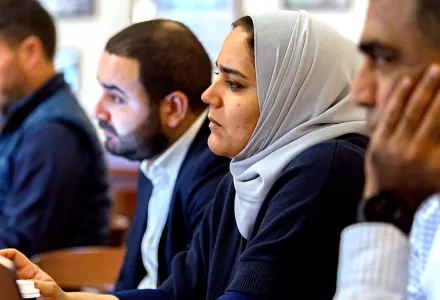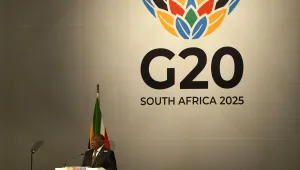
Hundreds of students and others from the greater Harvard community took part in Belfer Center study groups this fall. Focusing on Middle East reform, use and abuse of intelligence, and the origin and potential for the CHIPS and Science Act, these fall groups provided an opportunity for generally small groups to interact over a period of weeks with Belfer Center and visiting experts.
Students interested in the Middle East had an opportunity to meet with MEI Senior Fellow Omar Razzaz, former Prime Minister of Jordan, during a three-part study group entitled “Policy vs. Politics & the Path to Reform: Insights from the Field.” The students explored reform attempts in social protection, education, taxation, and public sector accountability. The group further discussed how one can manage short-term political interests without losing sight of longer-term policy objectives which may render development results in the long term.

Another Middle East Initiative study group led by Senior Fellow Abdulkhaleq Abdulla examined the many aspects of “The Gulf Moment,” the challenges it faces and its future unfolding. Sessions focused on the idea of this moment in contemporary Arab history, the key challenges the region faces in light of the Gulf rift, and the KHALEEJI State concept – or socio-political regional identity shared by citizens of six Gulf states) as a new analytical framework to study contemporary Arab Gulf States.
The Intelligence Study Group, organized by the Center’s Intelligence Project, is designed for students considering careers in government or private sector intelligence, as well as for those interested in a broad introduction to the uses and abuses of intelligence. With more than 90 applicants this semester (and only 30 seats available), this study group remains extremely popular. Led by Harvard Lecturer and Intelligence Project Associate Michael Miner, former senior CIA officer and Intelligence Project Director Paul Kolbe, Intelligence Project Director of Research Calder Walton, and Intelligence Project Program Manager Maria Robson-Morrow, this study group focused on the concept of “applied history” to examine how intelligence enhances policy decision-making, where it fails, and the differences between intelligence in liberal democracies and one-party states.
A Technology and Public Purpose Project (TAPP) study group focusing on the new Chips & Science Act: Origins and Ambitions attracted a number of students interested in this forward-looking plan. The study group, led by TAPP Fellow Doug Calides, Chief of Staff to U.S. Senator Amy Klobuchar, is discussed elsewhere in this newsletter. Read more about the study group here.
“Study Groups Explore Vital Issues from Middle East Reform to Intelligence Careers.” Belfer Center Newsletter, Belfer Center for Science and International Affairs, Harvard Kennedy School. (Fall 2022).

